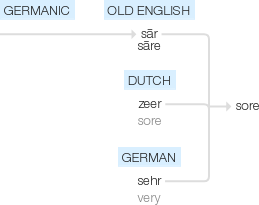Sore
Old English sār (noun and adjective), sāre (adverb), of Germanic origin; related to Dutch zeer ‘sore’ and German sehr ‘very’. The original sense was ‘causing intense pain, grievous’, whence the adverbial use.
wiktionary
From Middle English sor, from Old English sār(“ache, wound”, noun) and sār(“painful, grievous”, adjective), from Proto-Germanic *sairaz(adjective) (compare Dutch zeer(“sore, ache”), Danish sår(“wound”)). (compare German sehr(“very”)), from Proto-Indo-European *sh₂eyro-, enlargement of *sh₂ey-(“to be fierce, afflict”) (compare Hittite[script needed](sāwar, “anger”), Welsh hoed(“pain”), Ancient Greek αἱμωδία(haimōdía, “sensation of having teeth on edge”)).
See sord.
Old French saur, sor, meaning "sorrel; reddish".
etymonline
sore (adj.)
Old English sar "painful, grievous, aching, sad, wounding," influenced in meaning by Old Norse sarr "sore, wounded," from Proto-Germanic *saira- "suffering, sick, ill" (source also of Old Frisian sar "painful," Middle Dutch seer, Dutch zeer "sore, ache," Old High German ser "painful," Gothic sair "pain, sorrow, travail"), from PIE root *sai- (1) "suffering" (source also of Old Irish saeth "pain, sickness").
Adverbial use (as in sore afraid) is from Old English sare but has mostly died out (replaced by sorely), but remains the main meaning of German cognate sehr "very." Slang meaning "angry, irritated" is first recorded 1738.
sore (n.)
Old English sar "bodily pain or injury, wound; sickness, disease; state of pain or suffering," from root of sore (adj.). Now restricted to ulcers, boils, blisters. Compare Old Saxon ser "pain, wound," Middle Dutch seer, Dutch zeer, Old High German ser, Old Norse sar, Gothic sair.
